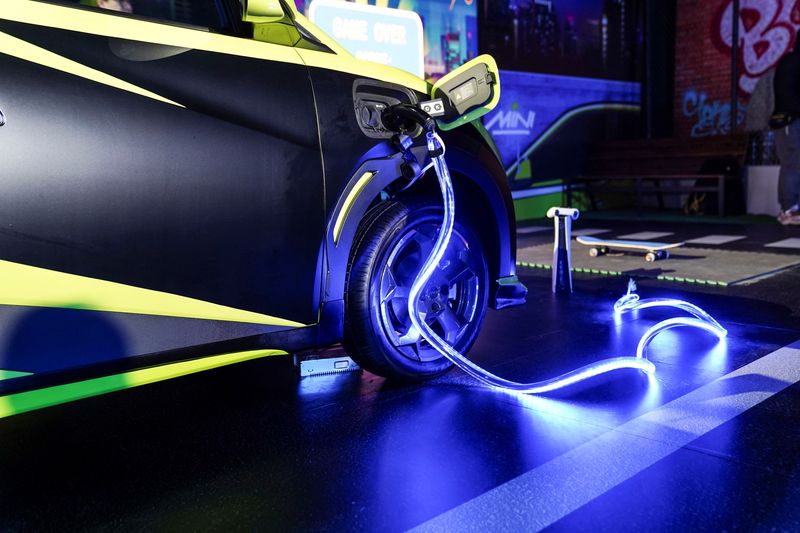
© Reuters. The BYD EV Dolphin Mini is displayed as the Chinese electric-vehicle producer announces the launch of the low-cost EV in Mexico City, Mexico February 28, 2024. REUTERS/Toya Sarno Jordan/File Photo
002594
-1.23%
Add to/Remove from Watchlist
Add to Watchlist
Add Position
Position added successfully to:
Please name your holdings portfolio
Type:
BUY
SELL
Date:
Amount:
Price
Point Value:
Leverage:
1:1
1:10
1:25
1:50
1:100
1:200
1:400
1:500
1:1000
Commission:
Create New Watchlist
Create
Create a new holdings portfolio
Add
Create
+ Add another position
Close
VLVLY
+1.43%
Add to/Remove from Watchlist
Add to Watchlist
Add Position
Position added successfully to:
Please name your holdings portfolio
Type:
BUY
SELL
Date:
Amount:
Price
Point Value:
Leverage:
1:1
1:10
1:25
1:50
1:100
1:200
1:400
1:500
1:1000
Commission:
Create New Watchlist
Create
Create a new holdings portfolio
Add
Create
+ Add another position
Close
SHANGHAI (Reuters) – Chinese automakers seeking global growth are building more car factories in overseas markets, as foreign regulators mull imposing measures against imports of China-made electric cars.
Chery Auto is holding talks with the Italian government to manufacture there, Reuters reported on Wednesday. Should the talks succeed, Chery would be among the first Chinese automakers with a European manufacturing presence.
The growing clout of China car exports has been causing friction with the U.S. and Europe.
Here’s what Chinese automakers are planning:
BYD (SZ:002594)
The world’s largest EV maker has been building car factories in Thailand, Brazil, Hungary and Uzbekistan.
BYD started production at the Uzbekistan plant in January with a Song Plus hybrid crossover. The factory has a planned annual production capacity of 300,000 vehicles.
Under a partnership with Thai industrial developer WHA Group, BYD will produce 150,000 EVs per year in Thailand and its local plant is expected to start operation later this year.
Its Brazil manufacturing complex is expected to start operations by year-end, or in early 2025, with an estimated annual production capacity of 150,000 units in the first phase.
BYD announced its Hungarian plant producing EVs and plug-in hybrids in December, saying it would create thousands of local jobs, boost the local economy and support local supply chains. It didn’t say when production could start.
BYD also said it is looking for a location in Mexico for a factory with production capacity of 150,000 cars annually for local sales solely.
BYD has capacity to produce 4 million cars in China annually. Its biggest overseas markets in 2023 included Thailand, Brazil, Israel and Australia.
CHERY AUTO
Chery Auto, China’s largest automaker by export volume, said last year it would invest $400 million to set up a factory in Argentina producing 100,000 cars by 2030.
The company sold more than half of its cars outside of China in 2023, the majority of them with gasoline engines. Russia is its largest overseas market while it also has a big presence in Latin America.
In 2014, it set up a plant in Brazil which has an annual capacity of 150,000 units.
Chery is considering building a car factory in the UK this decade, the Financial Times has reported.
SAIC MOTOR
State-owned SAIC, China’s second-largest auto exporter with its MG-branded cars, is looking for a site in Europe to set up a plant for EV production.
SAIC has built three overseas car plants in Thailand, Indonesia and India. It also has a so-called knocked down (CKD) assembly plant in Pakistan where it puts together cars from parts delivered to the site.
GREAT WALL MOTOR
Great Wall Motor has a factory in Thailand with an annual capacity of 80,000 units.
GEELY GEELY.UL]
Geely, whose brands include Lotus and Volvo (OTC:VLVLY), has factories in Belarus, United Kingdom and Indonesia.
Source: Investing.com






























